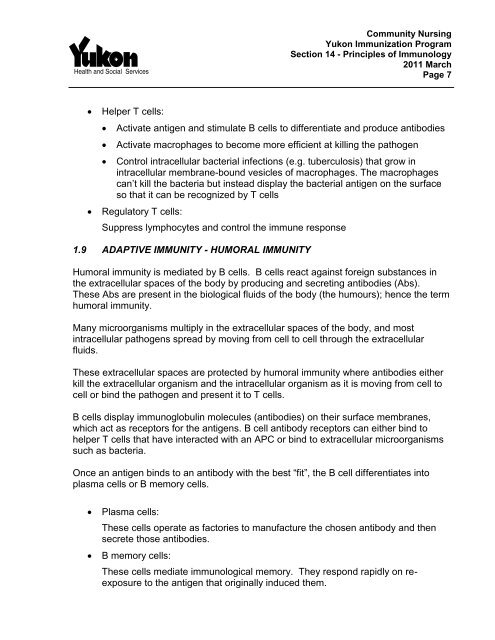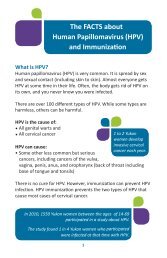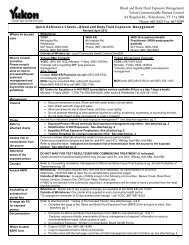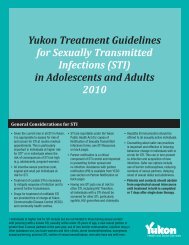Principles of Immunology - Health and Social Services
Principles of Immunology - Health and Social Services
Principles of Immunology - Health and Social Services
Create successful ePaper yourself
Turn your PDF publications into a flip-book with our unique Google optimized e-Paper software.
Community Nursing<br />
Yukon Immunization Program<br />
Section 14 - <strong>Principles</strong> <strong>of</strong> <strong>Immunology</strong><br />
2011 March<br />
Page 7<br />
<br />
<br />
Helper T cells:<br />
<br />
<br />
<br />
Activate antigen <strong>and</strong> stimulate B cells to differentiate <strong>and</strong> produce antibodies<br />
Activate macrophages to become more efficient at killing the pathogen<br />
Control intracellular bacterial infections (e.g. tuberculosis) that grow in<br />
intracellular membrane-bound vesicles <strong>of</strong> macrophages. The macrophages<br />
can’t kill the bacteria but instead display the bacterial antigen on the surface<br />
so that it can be recognized by T cells<br />
Regulatory T cells:<br />
Suppress lymphocytes <strong>and</strong> control the immune response<br />
1.9 ADAPTIVE IMMUNITY - HUMORAL IMMUNITY<br />
Humoral immunity is mediated by B cells. B cells react against foreign substances in<br />
the extracellular spaces <strong>of</strong> the body by producing <strong>and</strong> secreting antibodies (Abs).<br />
These Abs are present in the biological fluids <strong>of</strong> the body (the humours); hence the term<br />
humoral immunity.<br />
Many microorganisms multiply in the extracellular spaces <strong>of</strong> the body, <strong>and</strong> most<br />
intracellular pathogens spread by moving from cell to cell through the extracellular<br />
fluids.<br />
These extracellular spaces are protected by humoral immunity where antibodies either<br />
kill the extracellular organism <strong>and</strong> the intracellular organism as it is moving from cell to<br />
cell or bind the pathogen <strong>and</strong> present it to T cells.<br />
B cells display immunoglobulin molecules (antibodies) on their surface membranes,<br />
which act as receptors for the antigens. B cell antibody receptors can either bind to<br />
helper T cells that have interacted with an APC or bind to extracellular microorganisms<br />
such as bacteria.<br />
Once an antigen binds to an antibody with the best “fit”, the B cell differentiates into<br />
plasma cells or B memory cells.<br />
<br />
<br />
Plasma cells:<br />
These cells operate as factories to manufacture the chosen antibody <strong>and</strong> then<br />
secrete those antibodies.<br />
B memory cells:<br />
These cells mediate immunological memory. They respond rapidly on reexposure<br />
to the antigen that originally induced them.




![Women and Alcohol: A women's health resource [2326.26 KB ]](https://img.yumpu.com/22340649/1/190x245/women-and-alcohol-a-womens-health-resource-232626-kb-.jpg?quality=85)











